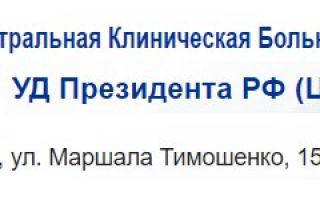A multidisciplinary clinic with a clinic, there is a paid department.
Detailed information can be obtained on the website http://cchp.ru and
by phone (495) 530-01-11; (495) 530-01-11.
Content
About the clinic
The Federal State Budgetary Institution “Central Clinical Hospital with Clinic” of the Administration of the President of the Russian Federation was founded in 1957. Located on the territory of an ancient park in an ecologically clean area of Moscow. Over its history, the Central Clinical Hospital has become famous for its advanced medical technologies and vast practical and scientific experience in providing medical care. The hospital is a multidisciplinary institution with 1,200 beds. Eleven buildings of therapeutic, surgical, neurological, pediatric, obstetric-gynecological, infectious diseases, radiological and other profiles, as well as a unique rehabilitation complex, work to achieve the main result - the speedy recovery of our patients. For the youngest patients, it is possible to share a hospital stay with their parents. The Federal State Budgetary Institution "Central Clinical Hospital with a Clinic" is a city of health, which has everything for modern diagnostics, treatment and early rehabilitation of patients.
Gastroenterology
The department is essentially a modern gastroenterological center, in which up to 50 patients can be treated simultaneously, there are single and double rooms, and luxury rooms. The rooms have a toilet, shower, refrigerator, and TV. Diagnosis and treatment are carried out in accordance with Russian and world standards.
The department diagnoses and treats all major diseases of the digestive system:
- peptic ulcer (stomach and duodenum), erosive lesions of the upper gastrointestinal tract, post-gastroresection disorders,
- gastroesophageal reflux disease (erosive, nonerosive),
- chronic cholecystitis, functional disorders of the biliary tract (dyskinesia), postcholecystectomy syndrome,
- chronic pancreatitis, rehabilitation treatment after pancreatic surgery,
- chronic hepatitis and cirrhosis of viral and alcoholic etiology,
- chronic non-ulcerative colitis, irritable bowel syndrome, intestinal dysbiosis, nonspecific ulcerative colitis and Crohn's disease,
- polyps of the stomach and colon.
Diagnostic capabilities
The center is equipped with modern equipment that allows the following types of research:
- Ultrasound of the abdominal organs, pelvis, etc.;
- endoscopic studies: esophagogastroduodenoscopy and colonoscopy with targeted biopsy, histological and cytological examination of biopsy specimens, including Helicobacter pylori;
- intraendoscopic study of pH in the esophagus, stomach and duodenum, fractional duodenal intubation;
- retrograde cholangiopancreatography, liver puncture biopsy;
- laboratory diagnostics with the study of a wide range of indicators (general clinical, biochemical, immunological, bacteriological, etc.);
- the whole range of radiographic studies: fluoroscopy of the upper gastrointestinal tract, passage through the small intestine, irrhmoscopy, virtual colonoscopy, spiral computed tomography with oral and intravenous contrast, magnetic resonance imaging, positron emission tomography;
- complex of radioisotope research methods.
Treatment
According to indications, highly qualified specialists of a narrow profile (neurologists, surgeons, oncologists, cardiologists, otolaryngologists, ophthalmologists, dermatologists, etc.) are involved in the examination and treatment of patients.
The department has accumulated unique experience in the treatment of digestive diseases in elderly patients, anti-Helicobacter therapy and antiviral treatment of chronic viral hepatitis. The use of modern diagnostic methods and the most effective medications leads to a significant reduction in the length of stay of patients in the hospital. About 1,000 patients are treated in the department every year.
Proctology
At the proctologist's appointment, the Doctor will listen to your complaints, ask about your living conditions at home and at work, and conduct an examination in the diagnostic chair. Based on the results of the examination, he will determine further examinations and (or) prescribe treatment, as well as give recommendations on nutrition and lifestyle. Additional examinations that a proctologist may prescribe
- colonoscopy,
- anoscopy,
- sigmoidoscopy,
- general blood analysis,
- general urine test,
blood group and Rh factor, - hemostasiogram,
- blood test for hepatitis B, C, HIV, syphilis,
- blood chemistry,
- electrocardiography,
- consultations with relevant specialists.
The need for certain examinations in each individual case is determined by the doctor.
All services
- Obstetrics, pregnancy management
- Angiography
- Gastroenterology
- Hematology
- Genetics
- Hepatology
- Gynecology
- Hospitalization
- Dermatovenereology
- Child and adolescent medical care
- Comprehensive diagnostics
- Infectious diseases
- Cardiology
- Comprehensive medical care
- Computed tomography (CT)
- Exercise therapy
- Magnetic resonance imaging (MRI)
- Mammalogy
- Manual therapy
- Neurology
- Neurosurgery
- Nephrology
- Oncology
- Osteopathy
- Otolaryngology (ENT)
- Ophthalmology
- Pediatrics
- Proctology
- Occupational pathology
- Procedural services
- Psychology
- Psychotherapy and psychiatry
- Pulmonology
- Rehabilitation and restorative treatment
- Rheumatology
- X-ray
- Sexology
- Ambulance and home help
- Dentistry
- Audiology
- Therapist (general practice)
- Therapy
- Traumatology and orthopedics
- Trichology
- Ultrasound examination (ultrasound)
- Urology
- Physiotherapy
- Functional diagnostics
- Surgery
- Electrocardiography (ECG)
- Endocrinology
- Endoscopy







